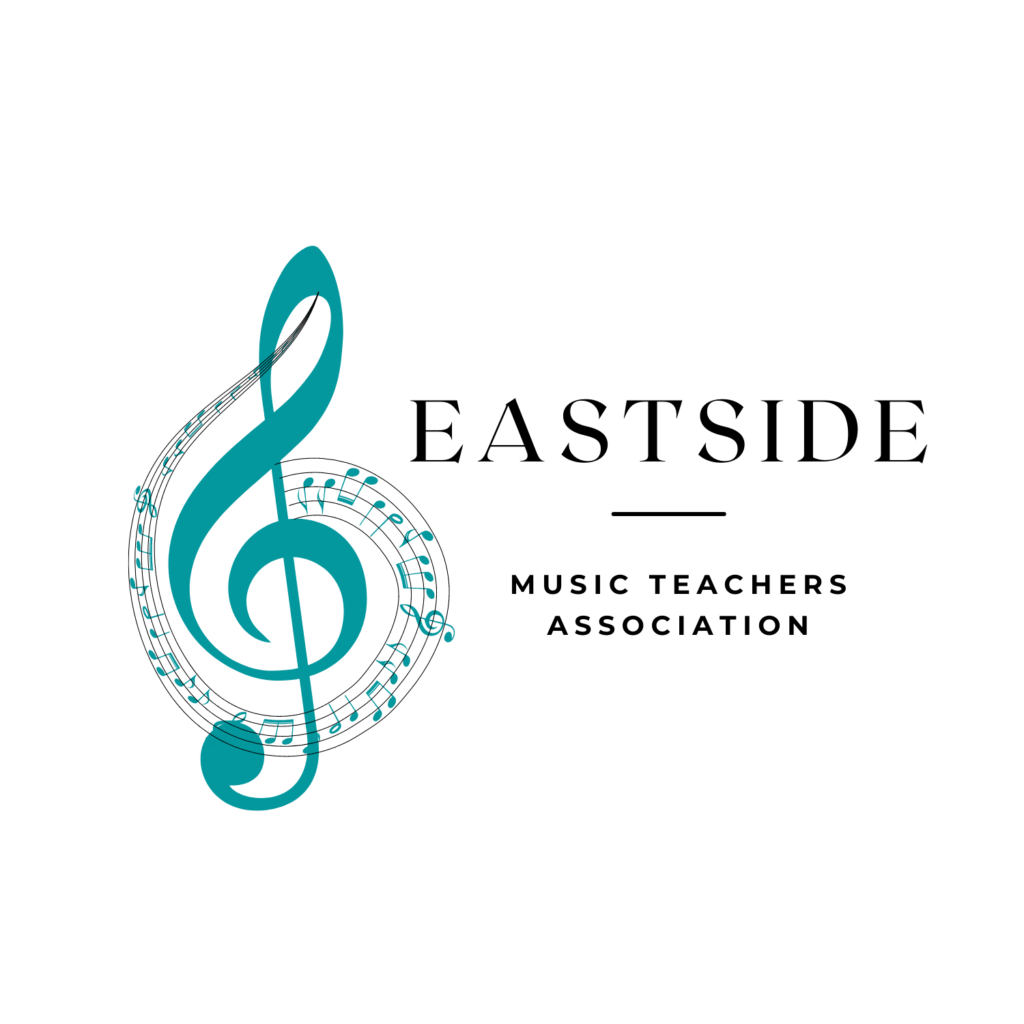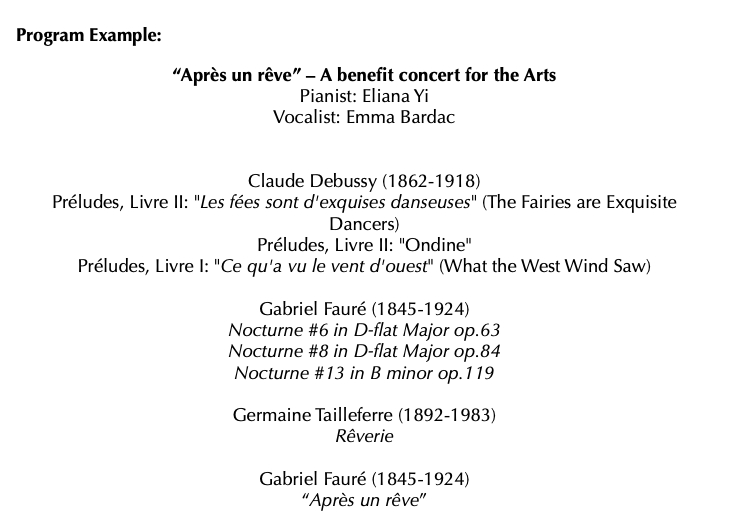Eastside MTA
Student Essay Event
Eliana Yi ~ Chair
Topic: Your “Dream Recital” Program
You are a virtuoso concert artist. Create a program for a classical music concert featuring the instrument that you currently study and write program notes that the audience will read before you come on stage. The only requirements: your recital must be 30-60 minutes long. At least one of your pieces must be collaborative (meaning someone else is playing with you on any instrument; it can be a duet, a string quartet, even an orchestra).
Program notes can be 300-700 words long
In order to receive monetary awards, qualifying entrants’ essays WITH YOUTUBE VIDEO LINK must be submitted along with this application form to Eliana Yi by January 15. Essays will be uploaded online. (Please note if you don’t want your video on Youtube accessible to the public, set your video to “unlisted”. Do not set video to “private”.)

Ideas and Guidelines:
- You can use a piece you play right now, or have played before, but even better to research and listen to pieces you have not yet played that are on your bucket list.
- Do you want your recital to have a theme? (Same composers, comparison of two different composers, one time period, type of composition, topic of the pieces) Or no theme at all?
- What kind of recital are you holding? A grand concert debut? A small community recital? A fundraising concert? A house concert for friends? An online live-stream?
- Playing well-known works is always great, but you can also represent lesser-known composers and lesser-known works
What you can talk about:
o Who the composer is
o Why the composer wrote the piece
o What was happening while the composer was writing this piece
o The story or topic behind the piece
o The form and structure of the piece
o Why you chose this piece for your recital
o What you want the audience to hear and think about as you play
Be creative with formatting!
Video record yourself reading your program notes as if you are an announcer introducing the concert before it begins.
Essays will be selected based on writing quality, creativity, and depth of knowledge on the subjects. Think about writing your program notes in a way that will inspire an audience to enjoy your concert (and come to your future ones). In order to receive monetary awards, qualifying entrants’ essays must be submitted along with this application form to Eliana Yi by February 15, 2025. Students with qualifying essays will also be required to make a video of themselves reading their essay to be submitted before February 15 to elianayi@yahoo.com.
Essay videos will be presented at the February or April general meetings of the EMTA chapter. Essays will be uploaded online. (Please note if you don’t want your video on Youtube accessible to the public, set your video to “unlisted”. Do not set video to “private”.)
Students cannot receive a scholarship for two consecutive years. All students are encouraged to participate and will be recognized even if they are ineligible to receive a scholarship this year.
Scholarship money is funded by the Woodcock Enrichment Endowment Fund.
Email the following to elianayi@yahoo.com by February 15:
1. Student Name, Student’s teacher, student age, student grade
2. Recital Program
3. Program notes
4. Youtube Video Link

Program Notes Example:
“Après un rêve” translates to the moment after a dream, when the world of fantasy and the world of reality are still intertwined. Like dreams, music has the power to transport one into different worlds and moods. Two composers who do this with innovation and artistic beauty are Debussy and Fauré, though they have their own distinct styles.
The program opens with three Debussy preludes. The ‘title’ of each prelude is written at the end instead of the beginning because Debussy wanted the listener to have free reign of their imagination before being influenced. I have included a few captivating illustrations by Arthur Rackham who’s art inspired Debussy many times. The connection between Rackham’s wraithlike art and Debussy’s ethereal sound is quite apparent. First, I will play his watercolor-like prelude, “The Fairies are Exquisite Dancers” then I will play Debussy’s interpretation of the story of Ondine, a fairytale of a mermaid who falls in love and has her heartbroken by a man she meets on land. In revenge, she curses him and returns to the sea. The last piece is considered one of Debussy’s more virtuosic works and sounds exactly like a wild wind tearing through plains, cliffs, and ocean, ending in a great triumphant blast of sound.
Fauré’s nocturnes are considered some of the composer’s best works. He wrote them throughout his life, and one can track his progression and maturity as a composer through them. A nocturne is a piece that is inspired by and evocative of the night. It is usually lyrical in nature, with gentle accompaniment and a singing voice. Fauré’s nocturnes could certainly rock one to sleep, but these moments lie amidst periods of tension, turbulence, and passion. It is not so much the release of sleep, but the surrender to a wild dream. It is especially poignant to listen to Nocturne #13, one of Fauré’s last compositions, when encroaching deafness caused the composer great strife before he died.
Germaine Tailleferre is a French composer of the 20th century. She wrote many chamber works, concertos, songs, and operas throughout her lifetime. She is known for being part of the composer group “Les Six”, its only female member. Recognition of her works are continuing to grow and I hope to hear more Tailleferre being performed in the future.
Lastly, we will conclude the program with the popular Fauré melody, “Après un rêve”. It is about a dreamer who just had a dream that they spent a wonderful night with a lover. However, the dreamer wakes up knowing it was all fantasy but wishing to return to that beautiful time again. It is a fitting ending after spending this hour with such rich and beautiful French music
Eastside MTA
Past Student Essay Events



Registration Form
In order to receive monetary awards, qualifying entrants’ essays must be submitted along with this application form to Eliana Yi by February 15, 2025. Students with qualifying essays will also be required to make a video of themselves reading their essay to be submitted before February 15 to elianayi@yahoo.com. Essay videos will be presented at the February or April general meetings of the EMTA chapter.
Presentation time will be 10:00am – 10:30am
general info & inquiry
Have a Question?
Eastside Music Teachers Association serves music teachers who live or work on the Eastside. Looking to connect with fellow teachers? Looking for continuing teacher education? Looking for events at all levels for your students?
EMTA is for you! Contact us below.